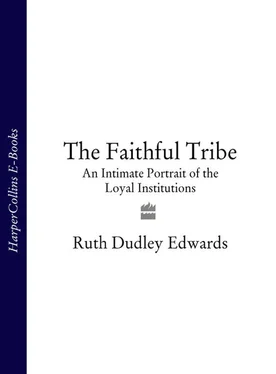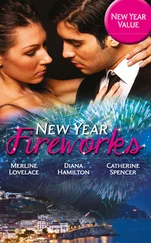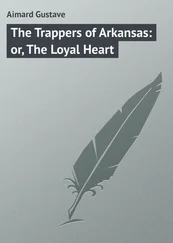Orangemen know what they’re about. They show that responsibility, that dignity, that restraint and that discipline. That’s what we are about. That’s what we project to the world. That’s what I trust, ladies and gentlemen, we always will be about.
It’s been my pleasure to be here and I thank Donegal for the warmth of welcome, for their hospitality and for the real dignity that they have shown this afternoon. Thank you very much.
He was answered by an aged Orangeman.
Thanks, Brother Foster, for your kind words. In regard of the County of Donegal I could be possibly one of the oldest Orangemen here today. I have been connected with the County Donegal Grand Lodge for over sixty years, and I have been attending the Twelfth of July parades for somewhere around seventy-five years. And I want people to see the way the Orangemen here and our brothers of Northern Ireland are and we never had no friction whatsoever. We came and went home peacefully and quietly and there was no act of discredit to our collarettes.
Then Antrim:
Most Worshipful Grand Master, Imperial Grand Master, Worshipful County Grand Master, brethren, sisters and friends. * Being the last speaker I feel that I want to on this first occasion associate myself sincerely with all that the previous speakers have said. I came down with the North Antrim District Lodge and we had a wonderful trip down. This has been my first time down into the demonstration here and I would like to take this opportunity today on behalf of County Antrim Grand Orange Lodge to bring the good wishes of our County to the brethren of County Donegal here and all the brethren in the Republic of Ireland. We do appreciate what you have done for the good of our institution and we do wish and pray them God’s help as they work for the extension of God’s Kingdom here. Thank you very much indeed.
Finally there were the ‘few words of thanks’ on behalf of the County Grand Master, officers and members of County Donegal Grand Orange Lodge to all the brethren of the Grand Lodge of Ireland, county officers, district officers, sisters, today ‘for this grand and glorious day that we’re having here in Rossnowlagh’. There were thanks too to the ‘Reverend Brother’ who had conducted the service, to the giver of the ‘inspiring address’, to all the visiting lodges and bands who had attended, to County Grand Lodge for leading the parade, to the brethren of the district and the lodges for all their support and ‘heartfelt thanks to the Grand Master for visiting us, thanks to the ladies of Rossnowlagh, thanks to the owner of the land … we hope with God’s help that we’ll all be here next year … and may God bless you all and have a safe journey home and may we have a pleasant weekend’. *
Gerry and I walked back to the car park ahead of the parade. He had to file a report and I was rushing back to Northern Ireland to get the low-down on the latest negotiations over Drumcree.
8. Lurgan, 26 October 1997
It was Reformation Sunday. I had been held up in Belfast and had to drive at illegal speeds to get to Lurgan before the parade set off. I am vague about distances, but I realized I was getting close when soldiers, police and Land Rovers began to appear.
As I reached Lurgan and parked the car at the end of the main street, I could see a ceremony was in full swing. Denis Watson, the County Armagh Grand Master, and officials of the Lurgan male and female lodges were laying wreaths at the war memorial. Watching respectfully were twenty or thirty men in suits, a couple of dozen women in big Sunday hats and maybe twenty girls. All were wearing Orange collarettes.
Standing slightly to the side were the preacher for the day, the Reverend Brian Kennaway, and Graham Montgomery, who was holding, upside-down, a pile of six bowler hats, for those performing the remembrance ceremony needed to be bareheaded. Typically, despite the solemnity, I got an immediate smile and nod from Brian and Graham and the other three or four Orangemen I knew.
Only a couple of dozen locals watched this small parade walking to the annual Reformation Sunday service at Brownlow House, the headquarters of the Royal Black Institution, who share the Victorian Gothic building with their landlord, Lurgan Orange District. It was being rebuilt, having been damaged the previous year by petrol bombs on the day before the Apprentice Boys’ march in Derry. Many of the treasures of the Royal Black Institution were destroyed or damaged; it is costing about £8 million of public money (from the fund for compensation for terrorist damage) to repair and refurbish the house. The band, the Craigavon True Blues, seemed incongruous: they were a typical ‘blood-and-thunder’ band, containing young men one would rather avoid in a dark alley who wore bright blue uniforms and played the hymns like a call to battle. It is hard to avoid mixed feelings about these bands: on the one hand the macho, aggressive aura is off-putting; on the other, they’re wonderful to walk along with. That is why the republican bands that have emerged in the past decade or so are mirror-images of them.
So I walked along the pavement keeping pace with the band for the mile or so to Brownlow House. Here and there, a few residents came out of their houses and watched with the air of people pleased to have some diversion on a dull Sunday afternoon. We walked up the drive, someone opened the door and the members of the Orange Order went upstairs. The drummers wiped the perspiration from their faces and, along with the rest of the band, turned and went home.
Slightly ill-at-ease, although I had been invited, I followed the worshippers up the stairs and went to the back of the room. Many knew I’m from a Catholic background, and some of them even knew I’m an atheist, and I was nervous that my presence might therefore be offensive to some of them. But I was overlooking the determined hospitality of the rural Orangeman. * Denis Watson summoned me to the front bench, where I sat between Graham and a man I had met before, who gave me a big grin and said with heavy irony: ‘That was a very offensive parade, wasn’t it?’ It wasn’t the moment to tell him that you wouldn’t have to be neurotic or republican to find the Craigavon True Blues a bit much. The Worshipful Master of the lodge then removed my anxieties by making a kind reference to me in his opening remarks. I realized then that Orangemen are as unselfconscious about welcoming you to their worship as to their houses.
Brian Kennaway is a Presbyterian minister whose religious belief he describes as being ‘expressed in the simplicity of the Gospel recovered at the Reformation of the sixteenth century. That simple biblical religious belief affirms that salvation can only be achieved by grace alone through faith alone in Christ alone, revealed to us in the scriptures alone.’ For someone from the Roman Catholic tradition, the Calvinist dismissal of good works as an aid to salvation is always disconcerting, but Kennaway makes it clear that if you have faith, ‘good works will follow as evidence’. He quotes William Fenner: ‘Good works are a good sign of faith but a rotten basis for faith.’
I’d sung more hymns in the last couple of years than I had in the rest of my life and I’d become pretty expert at ‘O God, Our Help in Ages Past’ and ‘Stand Up, Stand Up for Jesus’, but I didn’t know three of the robust hymns that Kennaway had chosen. However, a large Orangeman was valiantly playing the tunes on a tiny electronic keyboard and I sang along as best I could.
Kennaway took as his biblical text 2 Chronicles 34, where King Josiah deals with false gods by having their altars broken down and their carved and molten images broken in pieces. As he read to us of the burning of the bones of the idolatrous priests upon their altars, Graham grinned at me broadly. (At the end of the service I went up to Kennaway and asked genially: ‘Brian, when you go off to lynch the priests, can I come too?’ He looked at me in horror and said, ‘Surely you didn’t think I meant …’ and then laughed when he realized I was pulling his leg.)
Читать дальше












